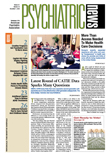Physicians in practices with the highest proportions of patients with chronic medical conditions were especially likely to have access to health information technology (HIT), according to a recent nationwide clinician survey.
The access to HIT among physicians with mainly chronic care patients remained strong in all five areas studied, according to a survey of a nationally representative sample of more than 6,600 physicians by the Center for Studying Health System Change (HSC). These areas were obtaining treatment guidelines, exchanging clinical data with other physicians, accessing patient notes, generating preventive reminders for the physician's use, and writing prescriptions. The data cover 2004 and 2005.
The survey found that the percentage of physicians reporting access to HIT grew since the last survey, which looked at 2000 and 2001 data across all practice settings.
Physicians in smaller practices continued to lag behind physicians in larger practices in access to clinical HIT, according to the survey results. For example, in the area of electronic prescription writing, the survey found that the gap between offices with fewer than 10 physicians and those with more than 50 got even larger since the last survey. In 2000 to 2001, 8 percent of physicians in small group practices and 19 percent of physicians in large group practices had such access, compared with 13 percent and 47 percent, respectively, in 2004-2005.
“Larger practices appear to be gaining critical mass in adopting IT for patient care, but the smallest practices, which account for more than half of all practicing physicians, appear to be at risk of being left behind,” said Joy Grossman, Ph.D., co-author of the study.
Grossman is a senior health researcher at HSC, a policy research organization funded primarily by the Robert Wood Johnson Foundation.
The study also found that physicians in practices treating more underserved and vulnerable patients—low-income, minority, or rural patients and those with chronic conditions—generally were at least as likely to report access to HIT in their practices as other physicians.
Access to HIT for exchanging clinical data and accessing patient notes was lower than average, however, for physicians practicing in community health centers. This finding, the survey authors said, highlighted the impact of financial barriers to HIT adoption for these two clinical activities.
The authors cautioned that the findings should be considered an upper boundary on the proportion of physicians regularly using clinical HIT in their practices because physicians were asked about HIT availability in their practices but not whether they actually use the technology or the frequency or intensity of such use.
